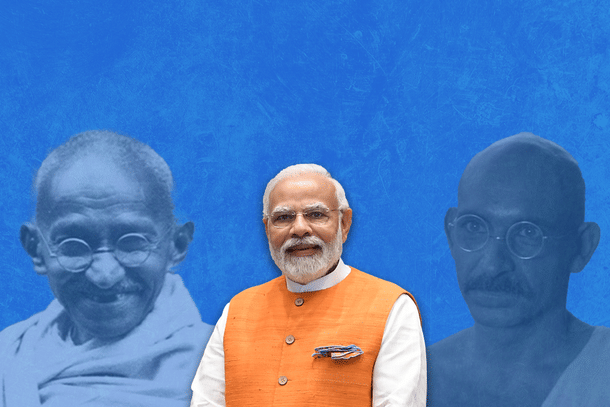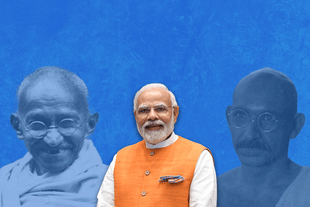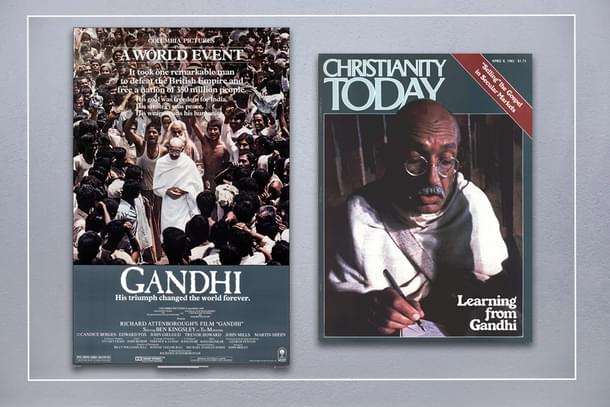Politics
Gandhi, 'Gandhi', And Modi
Aravindan Neelakandan
May 30, 2024, 05:18 PM | Updated 05:18 PM IST
Save & read from anywhere!
Bookmark stories for easy access on any device or the Swarajya app.


The media and the opposition have created yet another meaningless controversy over what Prime Minister Modi had actually said about Mahatma Gandhi and the 1982 Attenborough movie on the man.
On various occasions Prime Minister Modi himself had written about the influence of Gandhi on world leaders like Martin Luther King Jr. and Nelson Mandela.
The fact remains that for the average person outside India, when discussing civil rights or passive resistance, the image that typically comes to mind is Martin Luther King Jr. rather than Mahatma Gandhi. Definitely Gandhi, the 1982 movie of Richard Attenborough changed that.
It took Gandhi to a larger global audience. Though Attenborough made either an intentional or an unconscious effort to minimise the core Hindu value system of Gandhi, the movie nevertheless became an unintended vehicle of taking Hindu spirituality to the West.
So much so that Christianity Today, one of the most authoritative magazines of the US Protestant religion, came up with multiple articles on the movie and one of the articles lamented that the movie would have a crippling effect on evangelism in India.
A Hindu convert working as an evangelist told Christianity Today:
The film Gandhi presents major stumbling block to evangelism both in the West and in India.
In yet another article, the same magazine explored what a Christian should or could learn from the movie as well as the life of Gandhi.
Gandhi made it to the cover story of the magazine.

Here, the writer felt that even the nearly three-hour-long movie only granted the man who changed the global landscape a few more fleeting moments in the eyes of mass media.
The response of Christian evangelical world to the movie is a subject worthy of exploration by Hinduvaites.
In that article, the writer quoted without hesitation Gandhi's effective rejection of Christianity from a Hindu perspective:
It was more than I could believe that Jesus was the only incarnate son of God, and that only he who believed in him would have everlasting life. If God could have sons, all of us were His sons. If Jesus was like God, or God Himself, then all men were like God and could be God Himself. My reason was not ready to believe literally that Jesus by his death and by his blood redeemed the sins of the world. Metaphorically there might be some truth in it. Again, according to Christianity only human beings had souls, and not other living beings, for whom death meant complete extinction; while I held a contrary belief. I could accept Jesus as a martyr, an embodiment of sacrifice, and a divine teacher, but not as the most perfect man ever born. His death on the Cross was a great example to the world, but that there was anything like a mysterious or miraculous virtue in it my heart could not accept. The pious lives of Christians did not give my anything that the lives of men of other faiths had failed to give. I had seen in other lives just the same reformation that I had heard of among Christians. Philosophically there was nothing extraordinary in Christian principles. From the point of view of sacrifice, it seemed to me that the Hindus greatly surpassed the Christians. It was impossible for me to regard Christianity as a perfect religion or the greatest of all religions.
Before Attenborough's Gandhi, those who knew the Mahatma were either from the academia, media or polity and most of them were prejudiced against him. Of course, those like Martin Luther King Jr. derived their spiritual strength and methodology from him.
The article in Christianity Today also suggested a spiritual exercise to Christian religious leaders inspired by Gandhi:
I wonder how much more effective our spiritual leaders would be if we granted all of them Monday as a day of silence for reflection, meditation, and personal study. I cannot imagine a leader’s business manager—or, for that matter, constituency—permitting such a frivolous plan. Of course, daily demands are pressing, but were not those of Gandhi, leader of the second most populous country on earth?
The movie set a benchmark for biopics and inspired higher-quality films about Indian freedom fighters. Many Indians lamented that it took a Britisher to make a film about one of India's greatest sons. The quality of biopics about Indian freedom fighters improved notably after Gandhi.
While some in the Neo-Hindu right wing exhibit a dislike for Gandhi, the mainstream Hindutva movement has always regarded him as one of its guiding lights.
In fact, the thoughts of both Pandit Deendayal Upadhyaya and Dattopant Thengadi had strong Gandhian influences.
From social emancipation to a Hindu perspective of environmentalism, from resistance to conversion to visions of self-reliant and sustainable networks of communities, from alternative historiography of decolonisation to creating a holistic response to the civilisational challenge from the West, Gandhi is important to the Hindu civilisational story.
Yet it took a British director and a US movie company to take Gandhi so forcefully to global audience.
Part of the reason was the Nehru cult and the appropriation of the Gandhi surname by Nehru's successors. When Attenborough made his film, it was said that Indira Gandhi's government subtly influenced the director to portray Nehru as Gandhi's ideological heir, while Sardar Patel was shown as slightly comical and a hesitant follower.
When Modi pointed out that the West, not India, played a major role in popularising Gandhi worldwide, across all sections of society, it's important to understand the context and spirit of his message.
India needs Gandhi and his deep decolonising discourse. This will help it truly emerge as a civilisational counterbalance to the dominant models of society, history and development.
PM Modi only highlighted this issue and India's shortcomings in this field by citing the example of the 1982 movie.





